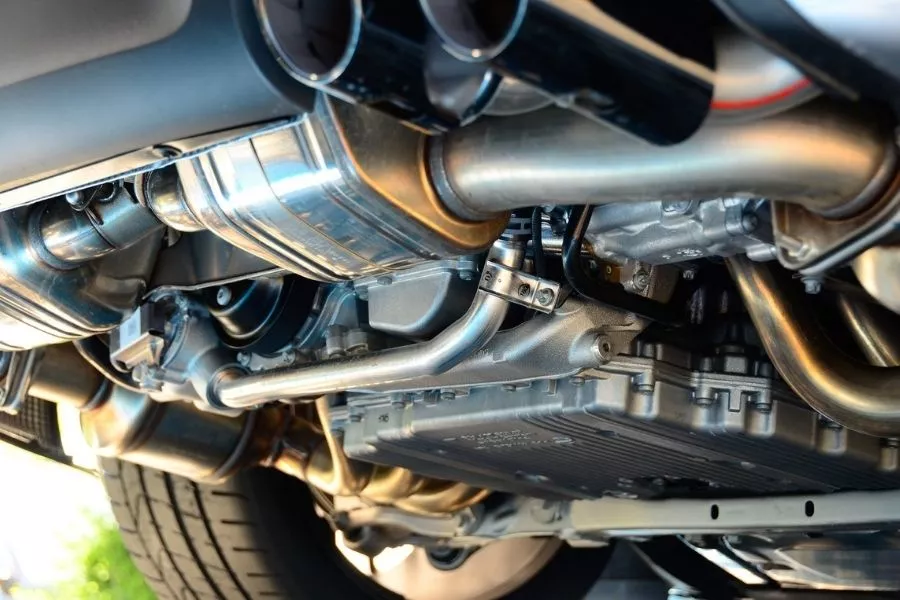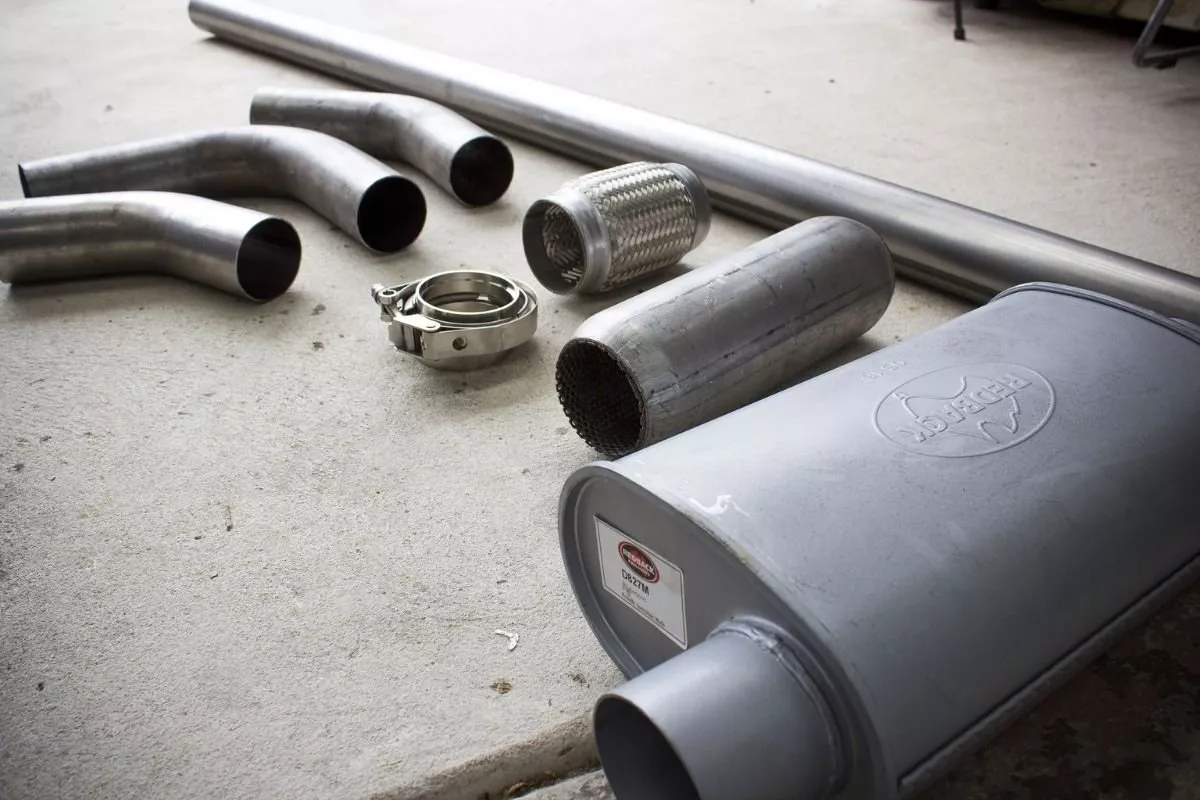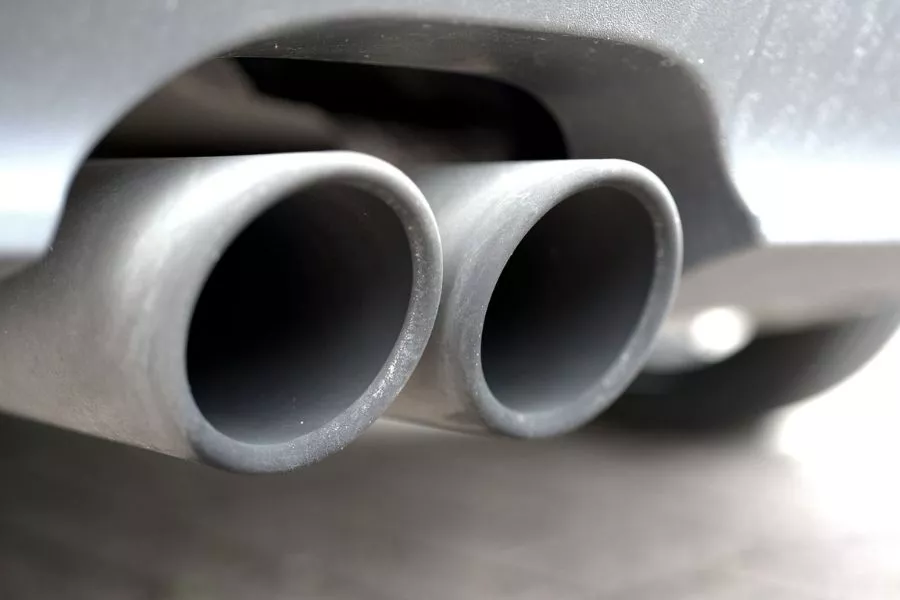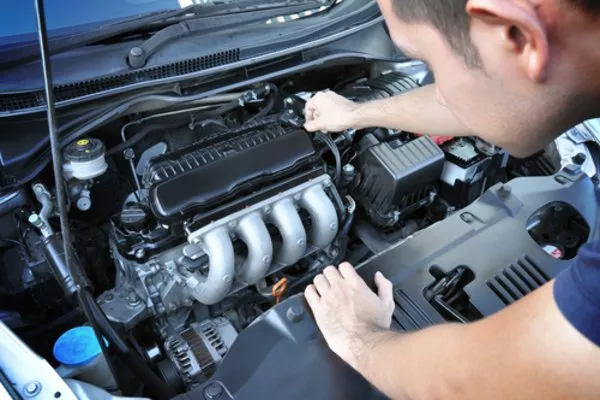What is an exhaust leak in cars?
An exhaust leak in a car occurs when your exhaust gases escape not from the end of the exhaust system but within it. By the sound of it, exhaust leaks can be dangerous considering the exhaust gases will not go through the catalytic converter, resonator, and mufflers which are standard among all production vehicles.
A catalytic converter (CAT) is the first stage of the exhaust system after the exhaust manifold which cleans the exhaust gas to make it more environmentally-friendly. It converts harmful substances from the engine such as hydrocarbons and carbon monoxide and converts them to cleaner substances such as water vapor and carbon dioxide.

Leaks can happen anywhere along the entirety of the exhaust system
The function of a resonator is to vary the sound of the exhaust gases coming from the engine, while the function of a muffler is to reduce or minimize the loud noises. Both components of the exhaust system are installed in production cars to reduce noise pollution.
A leak in your car’s exhaust system can be caused by various factors. One of the most common reasons is corrosion due to age and the usual high temperature the system works on. Blow-out or failing gaskets are also another reason why your car will experience leaking exhaust gases.
With all that being said, exhaust gases leaking before the said exhaust system components can be bad not only for your and your passenger’s health, but also for the environment. As such, exhaust leaks must be fixed as soon as possible to avoid facing problems for both your car and your health.

An exhaust system makes cars more environmentally-friendly
>>> Related: 8 easy tips to diagnose your car's exhaust problems
4 common car exhaust leak symptoms
Symptom #1: Bad odor
Since exhaust leaks don’t go through the catalytic converter, then they will end up in your cabin or the environment. Either way, you don’t want the bad odor of exhaust gases, which happens to be harmful as well, to be fuming out from your exhaust system.
The smell of leaking exhaust gas is not hard to tell even if it will be your first time encountering it. You don’t want to be breathing a leaking exhaust gas for a very long time especially if you have your children sitting at the back. If you are smelling a bad odor in your car, get your exhaust system checked as soon as possible.
Symptom #2: Louder engine noise
The reason why a resonator and a muffler are installed as standard to reduce noise pollution among cars. If an exhaust gas doesn’t go through these two exhaust system components, then it will make louder engine noises which are instantaneously noticeable even just after switching your car’s ignition to ON.
There could be different sounds a leaking exhaust system makes. The noise will depend on where the leak is occurring and how big the hole is. As such, you should know the sound of your car in normal operation so you can determine if there is a change in engine noise due to faulty components.

Listen carefully to what your engine is telling you
Symptom #3: Vibrating gas pedal
If you have bad senses of smell and hearing, then no worries. You can still determine if your exhaust is leaking when you feel like your car’s gas pedal is vibrating more than usual. The reason why this occurs is that there is an abnormal manner that your exhaust system which disrupts its optimum exhaust gas flow.
The longer you don’t work on your leaking exhaust system, the more you will feel the vibration getting more intense. Soon enough, you might start to feel that your steering wheel is vibrating aggressively as well. Consider visiting your local shop to make sure that the vibration is coming from a leaking exhaust system.
Symptom #4: Poor fuel economy
Not only will a leaking exhaust system hurt your senses, but also your pocket and your car’s performance. Exhaust car leaks can worsen your car’s fuel economy which will cause you to gas up more often. The abnormal flow of exhaust gases is causing your engine to work harder. Sensors are sending the incorrect readings to your car’s engine control unit (ECU) which disrupts the fuel economy. As such, we recommend that you check your average fuel consumption from time to time to determine whether it is getting worse due to bad car components.

All exhaust gases should exit from the muffler
>>> Related: Why is my car’s coolant low but there are no visible leaks?
How to fix exhaust leak in car
If you experience most of the said exhaust leak signs above, then it is a strong indication that you need to fix your car’s exhaust as soon as possible to avoid leakages. You should leave the fixing to the professionals as an exhaust system is an integral part of the operation of your car’s engine.
But if you decide to give it a go, you would need a welding machine to close the holes in your exhaust system. To find the holes, create a positive pressure by blowing air to the exhaust tailpipe using a vacuum. Once the vacuum is operational, spray a water and soap mixture to the exhaust lines and observe if bubbles are escaping.
After determining the locations of the holes, you can go ahead and weld them. If you don’t have a welder or you don’t have experience welding, you can also use other alternatives that are cheaper and easier to use such as sealant, putties, and tapes. Use a heat blower to thoroughly seal your chosen alternatives to make sure that they will stick for a long time.

Seal the holes up to avoid the damages a leaking exhaust imposes
FAQs about exhaust leaks
Q: What are the major components of an exhaust system?
An exhaust system is comprised of an exhaust manifold, catalytic converter, resonator, and muffler.
Q: Why do exhaust leaks occur?
It could be that the exhaust system is already old which means that it is likely to fail. Corrosion is another factor that causes leaks in an exhaust system.
Q: How long do exhaust manifolds last?
An exhaust manifold lasts for around six to eight years, depending on the usage and material.
Q: What will happen if I drive with an exhaust leak?
You will breathe fumes from the engine which are harmful to your health.
Q: Can a leaking exhaust system affect my car’s fuel efficiency?
Yes, it will disrupt the proper engine operation due to the abnormal airflow caused by leaks.
Here at Philkotse.com, we value your interest in the automotive industry. Visit our website to find out more.
Recent posts
- why is my coolant low but no leaks Mar 22, 2021
- car battery leaking causes what to do Mar 12, 2021
- White smoke from exhaust system Mar 08, 2021
- Engine oil myths and what to do when oil leaks happen Aug 17, 2022
- Modifying your car's exhaust systems: Which type to choose? Feb 08, 2021












